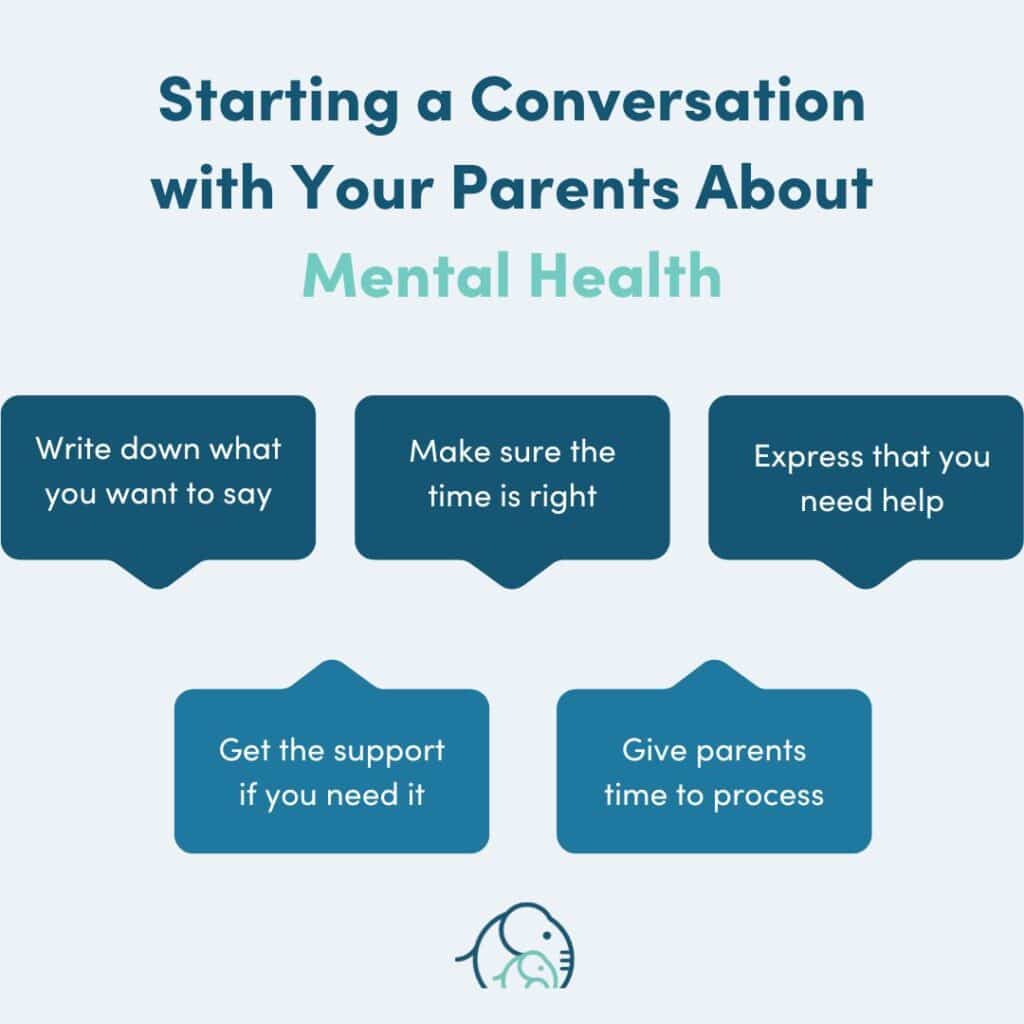If you’re struggling with your mental health, it can be very difficult to tell someone else how you feel. And even if you’ve been able to share that you’re having a hard time with a friend or another adult you trust, you might be reluctant to open up to your parents.
No one should have to deal with their mental health alone, and you might not quite understand why you feel the way you do. Therapy can make a big difference in helping you navigate mental health issues, stress, grief, or difficult life situations, and understanding how to ask your parents for therapy can be a good first step to getting the help you need.
Looking for a therapist you can trust? Get matched with a therapist near you today!
Why Can’t I Talk to My Parents About My Feelings?
Depending on your home situation, telling your parents what you’ve been experiencing might not be easy. You might feel afraid that your parents won’t understand how you feel or downplay the seriousness of what’s going on. On the other hand, if you share that you’re experiencing depression, anxiety, or other concerning mental health symptoms, you might be anxious that they’ll overreact or treat you differently.
The reality is that not everyone has a safe relationship with their parents. If your parents aren’t a great source of support for you, you live in an abusive household, or you’re simply not ready to share with your parents, you are not wrong for not wanting to tell them how you’re feeling.
It’s possible that you’ve already tried telling your parents that you need support, only for them to brush off the situation or make you feel like you’re being dramatic. You might even feel like your parents contribute to your poor mental health – if you have parents that are neglectful or abusive, that can have a very negative effect on your emotional and mental well-being.
If it’s not safe to talk to your parents about how you’re feeling or you just don’t feel comfortable talking with them yet, you don’t need to delay in getting the help you need. If possible, find another adult you can trust or confide in. This might be a teacher, a friend’s parent, a coach, a pastor, or maybe a different family member. There are also hotlines you can call if you don’t know where else to turn or need support right away, including:
- 988 Suicide & Crisis Lifeline (The National Suicide Prevention Lifeline): 988
- Teen Line: 800-852-8336
- Hopeline: 877-YOUTHLINE
How to Tell Your Parents You’re Struggling with Mental Health

When your parents love and support you, the last thing they want is for you to struggle alone. It makes total sense that you’re nervous to talk to them – even adults struggle to be vulnerable and reach out for help. However, deciding to talk to your parents about your mental health can make a huge difference in your life, both now and in the future.
Here are 5 tips on how to talk to your parents about your mental health:
1. Write Down What You Want to Say
If you’re worried you won’t have the right words to express how you’ve been feeling, it can help to put it in writing first. You could spend some time journaling before you talk with your parents to get your thoughts together, or, if it’s easier, you could write them a letter that you could read or show them, or even text or email.
Writing down your thoughts and feelings isn’t just about prepping for the conversation—it can also help you gain a deeper understanding of what you’re experiencing. Putting emotions into words forces you to slow down and reflect, which can bring clarity to feelings that might otherwise feel overwhelming or confusing. It also gives you a sense of control over those emotions, allowing you to process them in a way that feels safer and more manageable. The more you organize your thoughts in writing, the more confident you may feel when it comes time to share them, making the conversation with your parents a little easier to navigate.
Sidenote: Sometimes it can feel less scary or we have an easier time saying what we intend through text. If this is something you want to say but you’re nervous to do it in person, try saying it through text instead. You could write, “I want to bring something up, but I don’t know how to say it. I’ve been feeling really ____ lately and I think talking to a therapist might help.”
Looking for more tips on starting a mental health conversation? Check out our other blog for tips on how to talk to someone about their mental health.
2. Make Sure the Time is Right
Bring up the conversation during a time when your parents seem relaxed and can give you their full attention. This could be during your drive home from school or on a weekend when your parents are unoccupied. You can also let your parents know that you’d like to talk and schedule a time to have the conversation.
If talking to both parents at once feels like too much, it’s okay to approach them individually. You might feel more comfortable starting with the parent who tends to be more understanding or easier to talk to. And if one parent isn’t as approachable, you don’t have to force the conversation with both—starting with the person you trust most can help you feel more supported, and they may even be able to help you navigate things with the other parent later.
3. Express Your Need for Help
Tell your parents that you want to see someone who can help you, like a therapist. If you are direct in saying that you need help, your parents will better understand how they can support you.
Let your parents know that you want to talk to someone who can help, like a therapist. It might feel a little awkward or intimidating, but being direct about what you need makes it easier for them to understand how to support you. You don’t have to have all the details figured out—just saying that you’ve been struggling and think a therapist could help is enough. The more clear and direct you are, the more likely your parents are to take your request seriously.
Some ideas:
- “I’ve been feeling really _______ lately, and I think talking to a therapist could help.”
- “I’ve been struggling with a lot of stress and anxiety, and I don’t always know how to deal with it. I think a therapist could help me figure things out.”
- “I’ve been feeling really down lately and I’ve been wondering if medication might help.”
4. Get Extra Support If You Need it
If you’re worried about how your parents will react or want someone else there, you can reach out to another adult you trust or talk to a school counselor if there is one available to you. This extra person can give you advice on what to say, help you practice the conversation, or even be in the room while you talk to your parents.
5. GIve Your Parents Time to Process
It can be difficult for your parents to process that you are struggling. They might blame themselves, try to lecture you, act defensively, or not understand the seriousness of what you’re experiencing. Your parents might need some time to process what you’ve told them. If you express how you feel and your parents don’t get you the help you need right away, try again another time and explain that you still need support.
How Your Parents Can Help You With Your Mental Health
Once you tell your parents that you are struggling with your mental health, there are many ways they can support you:
They Can Support You in Therapy
Going to therapy can be difficult. If you’ve experienced trauma or struggle with suicidal thoughts, it can be really hard to talk about and work through those feelings. It can help if your parents understand what you’re going through so they know to expect shifts in your mood as you begin treatment. Your parents can help you find a therapist and can even attend the first sessions with you if you are afraid to go by yourself to start. Your parents can even seek therapy to help with their own mental health issues or to learn how to better support you.
They Can Help You Make Lifestyle Changes
If you struggle to sleep well, spend excessive time on social media, or don’t get enough exercise, these can all affect your mental health. Your therapist can help you identify lifestyle changes that could help you. But it’s hard changing your routine and the behaviors you’re used to! Your parents can help you stick to the changes you say you want to make.
They Can Talk Out Difficult Situations With You
Once you talk to your parents about your mental health, it makes it easier to talk to them about other areas in your life where you’re struggling. If you are struggling with your grades, are being bullied, or consistently feel sad, venting to your parents can help you feel heard and supported.
They Can Help You Practice and Learn Helpful Skills
Many people struggle with regulating their mood or knowing how to cope with difficult emotions. Your parents can help you practice skills your therapist teaches you, like what to do when you feel bad or how to deal with conflict or relationship issues.
Do You Need Help From a Therapist?
Reaching out for help is difficult, but your mental health is worth it! Whether you’re feeling stressed at school, having issues with your friends or your significant other, or experiencing low self-esteem or confidence, a therapist can help you feel seen and heard in your struggles. While talking with someone you don’t know can feel scary and uncomfortable at first, your therapist can help you navigate difficult feelings and situations in school, at home, or in your relationships. And if you’re struggling with a mental illness like depression, anxiety, or post-traumatic stress disorder (PTSD), your therapist can guide you in receiving the treatment you need.
Your mental health is so important! Get the help you need at Ellie Mental Health and we’ll help you find a therapist that’s the perfect fit.


